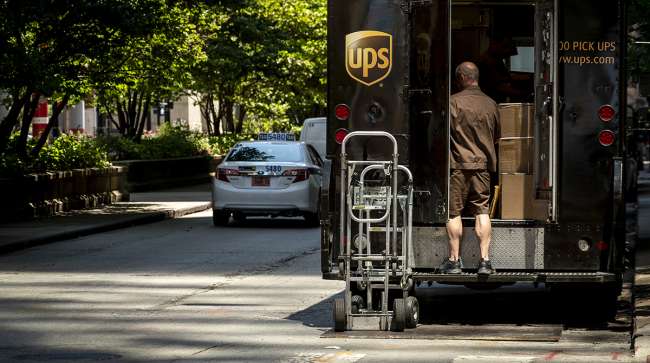A UPS delivery driver in Chicago. (Christopher Dilts/Bloomberg)
UPS Inc. expects to cut 20,000 jobs this year and close dozens of facilities as it dramatically reduces shipments for e-commerce giant Amazon.com Inc.
The reduction in its operational workforce — a group that includes delivery drivers and package handlers — is part of a network overhaul in response to expected “lower volumes from our largest customer,” UPS said April 29 in a statement that also detailed first-quarter results. The Atlanta-based company will shutter 73 leased and owned buildings by the end of June and said it may identify additional facilities for closure.
UPS aims to cut expenses and improve profitability after announcing a plan in January to slash the number of low-margin Amazon parcels it delivers by more than half over 18 months. The network reconfiguration is expected to generate $3.5 billion of total cost savings this year.
UPS has about 490,000 employees, suggesting the planned reduction will account for 4% of its staff. The move comes after it announced 12,000 management job cuts in early 2024.
UPS ranks No. 1 on the Transport Topics Top 100 list of the largest for-hire carriers in North America. Amazon.com Inc. ranks No. 1 on the Transport Topics Top 100 list of the largest logistics carriers in North America, No. 12 on the TT100 list of the largest private carriers and No. 1 on the Top 50 global freight list.
The courier has sought greater efficiency in the face of a drawdown in volumes following a pandemic-driven boom in e-commerce. The industry is also grappling with new challenges from President Donald Trump’s tariffs, which have complicated cross-border goods shipments and injected volatility into the global economy. UPS on April 29 backed away from its 2025 financial guidance, saying it wouldn’t provide an update “given the current macroeconomic uncertainty.”
Still, the company reported adjusted earnings of $1.49 a share for the first three months of the year, topping the $1.40 average of analyst estimates compiled by Bloomberg. Revenue in the period also narrowly beat expectations.
The “better-than-feared” results were boosted by gains in both domestic and international package revenue, Stephanie Moore, a Jefferies analyst, said in a note.
UPS shares rose 2.2% before regular trading in New York. Its stock tumbled 23% this year through the April 28 close.
UPS and FedEx Corp. are viewed as barometers for the wider economy because their delivery networks span the industrial and retail sectors, providing insights into orders placed by manufacturers and consumers alike. Investors across industries have been looking for clues to the impacts of Trump’s trade policies, which threaten to tip in the economy into a recession.
FedEx ranks No. 2 on the TT100 for-hire list.
UPS has been reworking its operations to shift away from low-margin parcels in favor of more profitable business lines. The company is working to position itself as a specialized logistics provider that can move higher-yield parcels such as temperature-controlled or urgent health care shipments.
It agreed last week to acquire Canada-based health care logistics company Andlauer Healthcare Group Inc. for $1.6 billion. The move is the latest in a string of deals as the company seeks to reach $20 billion in health-care revenue by 2026.
While UPS didn’t update its 2025 outlook, it said it would detail expectations for the second quarter on April 29. It previously predicted full-year revenue of about $89 billion and a full-year operating margin around 10.8%.
The decision not to update the annual forecast underscores the widespread uncertainty across corporate America after the Trump administration announced — and in some cases paused or adjusted — large tariffs on imports from other countries. Companies from American Airlines Group Inc. to footwear maker Skechers USA Inc. have pulled their outlooks, while UPS rival FedEx cut its outlook in March.






